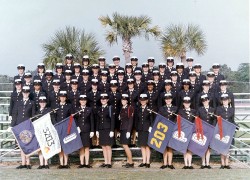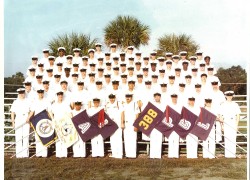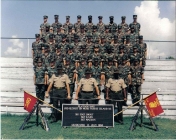Specialty Summary. Loads and unloads nuclear and nonnuclear munitions, explosives, and propellant devices on aircraft. Manages, controls, maintains, and installs aircraft bomb, rocket, and missile release, launch, suspension, and monitor systems; guns and gun mounts; and related munitions handling, loading, and test equipment.
Duties and Responsibilities:
Loads, unloads, and positions munitions on aircraft. Loads, positions, performs safing operations, and unloads munitions. Uses handling, loading, and checkout procedures and equipment. Tests suspension, launch, and release systems for retentive locking, and manual or electrical release. Analyzes malfunctions. Performs functional checks of launch and suspension systems. Prepares munitions and inspects post loading weapons. Operates handling and loading equipment, and mates munitions with aircraft release, launch, and suspension systems. Loads and services aircraft gun systems. Tests electrical and electronic circuitry for continuity, voltage, and proper operation. Tests for unwanted electrical signal or power before connecting electrically actuated explosives and propellants. Installs ground safety devices on munition and gun system components to prevent inadvertent detonation, launching, or firing. Inserts and removes impulse cartridges associated with fuel tanks and pylons. Adjusts and installs fuses, boosters, and delay elements in conventional munitions.
Inspects, repairs, and maintains aircraft release, launch, suspension, and monitor systems; aircraft guns; and related equipment. Operates, inspects, and performs operator maintenance on related munitions handling, loading, and test equipment. Examines for visual defects and proper installation of systems components such as munitions ejector racks, loading and suspension devices, shackles, rocket pods, pylons, aircraft ammunition, boosters, and feed chutes. Boresights and performs after-firing inspection of aircraft guns. Examines aircraft guns for defects. Analyzes malfunctions of munitions launch, release, suspension, and monitor systems, and associated handling and loading equipment. Disassembles, repairs, or replaces mechanical, electrical, electronic, and pneudraulic mechanisms of launch and release systems, and aircraft gun systems. Removes, disassembles, and inspects parts and subassemblies for damage, rust, corrosion, or acceptable clearances and tolerances. Makes adjustments and applies lubricants and preservatives. Performs serviceability tests on aircraft guns, gun systems, and munitions associated suspension equipment.
Performs armament systems maintenance functions. Modifies munitions launch, release, suspension, and monitor systems to improve efficiency. Determines probable effect of modifications on future maintenance and operational problems.
Plans, organizes, and directs aircraft armament systems maintenance activities. Establishes and evaluates performance and training standards, maintenance controls, and procedures. Checks methods and techniques used to load and unload munitions on aircraft, to repair and maintain aircraft release and gun systems, and to maintain, repair, and modify associated equipment. Ensures compliance with policies, directives, and safety procedures. Analyzes productivity and work quality. Evaluates operational efficiency of aircraft guns and munitions systems, and recommends modification.
Specialty Qualifications:
Knowledge. Knowledge is mandatory of: electricity; principles of physics, mechanics, electronics, and ballistics applying to munitions launch, release, suspension, fusing, and arming systems, and aircraft gun systems; use of precision measuring tools and equipment; interpreting schematics and wiring diagrams; concepts and application of maintenance directives; nuclear and nonnuclear munitions loading and safety procedures; and proper handling, use, and disposal of hazardous waste and materials.
Education. For entry into this specialty, completion of high school or General Education Development equivalency is mandatory. Also, completion of courses in mechanics or basic electronics is desirable.
Training. The following training is mandatory for award of the AFSC indicated:
AFSC 2W131X. Completion of a suffix specific basic aircraft armament systems course.
AFSC 2W171. Completion of the advanced aircraft armament systems course.
Experience. The following experience is mandatory for award of the AFSC indicated:
2W151. Qualification in and possession of AFSC 2W131C/E/F/J/K/L/N or Z. Also, experience loading and unloading munitions, or maintaining, repairing, and modifying munitions launch, release, suspension, or aircraft gun systems.
2W171. Qualification in and possession of AFSC 2W151. Also, experience performing or supervising functions such as loading and unloading munitions, or maintaining, repairing, and modifying munitions launch, release, suspension, or aircraft gun systems.
2W191. Qualification in and possession of AFSC 2W171. Also, experience managing and controlling functions such as loading and unloading munitions, or maintaining, repairing, and modifying munitions launch, release, suspension, or aircraft gun systems.
Other. The following are mandatory as indicated: For entry into this specialty, the following are mandatory: Normal color vision as defined in AFI 48-123, Medical Examinations and Standards. For entry, award, and retention of these AFSCs: No record of emotional instability. Normal depth perception as defined in AFI 48-123. For award and retention the following is mandatory: Specialty requires routine access to Secret material or similar environment. For award and retention of AFSCs 2W1XX, completion of a current National Agency Check, Local Agency Checks and Credit (NACLC) according to AFI 31‑501, Personnel Security Program Management. NOTE: Award of the 3-skill level without a completed NACLC is authorized provided an interim Secret security clearance has been granted according to AFI 31-501.




